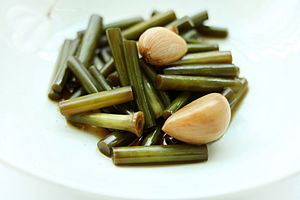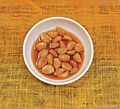Jangajji facts for kids

maneul-jong-jangajji (pickled garlic scapes and cloves)
|
|
| Alternative names | Pickled vegetables |
|---|---|
| Type | Pickles |
| Course | Banchan |
| Place of origin | Korea |
| Associated national cuisine | Korean cuisine |
| Korean name | |
| Hangul |
장아찌
|
|---|---|
| Revised Romanization | jangajji |
| McCune–Reischauer | changatchi |
| IPA | [tɕaŋ.a.t͈ɕi] |
Jangajji (Hangul: 장아찌) or pickled vegetables is a type of banchan (side dish) made by pickling vegetables. Unlike kimchi, jangajji is non-fermented vegetables, usually pickled in soy sauce, soybean paste, or chili paste. Jangajji dishes are usually preserved for a long period of time, and served with a drizzle of sesame oil. Preserved foods like jangajji were developed to attain a certain level of vegetable consumption during the long, harsh winters on the Korean peninsula.
Contents
Etymology
Jangajji (장아찌) is derived from Middle Korean jyangaetdihi (앳디히), that consists of the noun jyang (Hangul: ; Hanja: 醬; "soy sauce" or "soybean paste"), the genitive postposition -ae (-애), the inserted inter-siot -t- (-ㅅ-), and the noun dihi (디히; "kimchi").
Ingredients
Main ingredients vary according to region and temperature. Some examples are green garlic, garlic scapes, radish, cucumber, chili pepper leaves, chamoe, perilla leaves, and deodeok. Jangajji is usually pickled in soy sauce, soybean paste, or chili paste, but brine and diluted vinegar can also be used as the pickling liquid. Usually, vegetables are slightly dried or salted to prevent the addition of surplus moisture to the condiment. When served, jangajji is cut, then seasoned with sesame oil, sugar, and toasted sesame seed powder.
Varieties
- boksa-jangajji (복사장아찌) – pickled peach
- buchu-jangajji (부추장아찌) – pickled garlic chives
- chamoe-jangajji (참외장아찌) – pickled Korean melon
- cheoncho-jangajji (천초장아찌) – pickled chopi fruits
- doraji-jangajji (도라지장아찌) – pickled balloon flower roots
- gaji-jangajji (가지장아찌) – pickled eggplants
- kkaennip-jangajji (깻잎장아찌) – pickled perilla leaves
- maneul-jong-jangajji (마늘장아찌) – pickled garlic, both garlic scapes and cloves
- meowi-jangajji (머위장아찌) – pickled butterbur leaves
- mu-jangajji (무장아찌) – pickled Korean radish
- mu-mallaengi-jangajji (무말랭이장아찌) – pickled dried radish
- oi-jangajji (오이장아찌) – pickled cucumber
- pa-jangajji (파장아찌) – pickled scallions
- put-gochu-jangajji (풋고추장아찌) – pickled green chili peppers
- put-maneul-jangajji (풋마늘장아찌) – pickled green garlic
- saenggang-jangajji (생강장아찌) – pickled ginger
- sancho-jangajji (산초장아찌) – pickled prickly ash fruits
- umu-jangajji (우무장아찌) – pickled agar jelly
- yeolmu-jangajji (열무장아찌) – pickled young summer radish
Gallery
-
Bom-namul-jangajji (pickled spring herbs)
-
Gochu-jangajji (pickled chili peppers)
-
Kkaennip-jangajji (pickled perilla leaves)
-
Kkwari-gochu-jangajji (pickled groundcherry peppers)
-
Maneul-jangajji (pickled garlic)
-
Maesil-jangajji (pickled plums)
-
Mu-jangajji (pickled radish)
-
Myeongi-jangajji (pickled Siberian onion leaves)
-
Chamoe-jangajji (pickled chamoe, Korean melon)
See also
 In Spanish: Jangajji para niños
In Spanish: Jangajji para niños











